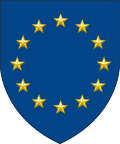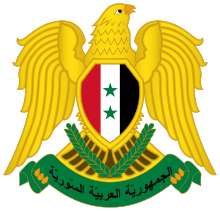Syria–European Union relations
The Syrian Arab Republic and the European Union (EU) have signed two agreements between each other. However, due to the Syrian government's crack down on its opposition, the EU is imposing an embargo on Syria.[1] Since 2011, the EU has supported the opposition Syrian National Council and calls for the present government to stand down.[2] Since 2012 it has recognised the opposition as legitimate representatives of the Syrian people.[3]
 | |
EU |
Syria |
|---|---|
In early 2012, several EU member states, including France, the United Kingdom, Italy and the Netherlands, closed their embassies in Damascus.[4]
Agreements
In 1977 the EU and Syria signed a Cooperation Agreement which governs relations, which serves as the foundation for EU-relations.[5] 2004 and 2008 saw further bilateral agreements between the EU and Syria.[5] Syria also joined the EU's Union for the Mediterranean (and previously the Barcelona Process) and the European Neighbourhood Policy - but does not fully benefit pending the application of the EU-Syria Association Agreement which was signed in 2009,[6] and was suspended from the Union for the Mediterranean in 2011.[7][8]
Since 2011
Following the Syrian civil uprising in spring 2011 and the resulting escalation of violence and human rights violations, the EU suspend bilateral cooperation with the Syrian government and froze the draft Association Agreement. Since then, the EU has suspended the participation of Syrian authorities in its regional programmes. The European Investment Bank(EIB) has suspended all loan operations and technical assistance. The EU established and then expanded targeted sanctions, including an arms embargo, asset freeze and travel ban on government members, and an oil embargo. Syria consequently suspended its membership of and participation in the Union for the Mediterranean. The EU Delegation in Syria remained open until December 2012.[3] In December 2012, the EU accepted the National Coalition for Syrian Revolutionary and Opposition Forces as "legitimate representatives" of the Syrian people.[3]
The EU is a member of the Friends of Syria Group.
Trade
Before the war, the EU was Syria's largest trading partner with €3.6 billion worth of EU goods exports to Syria and €3.5 billion of Syrian exports to the EU. Total trade was worth €7.18 billion in 2010 and the EU is Syria's largest trading partner with 22.5% of its trade (Syria is the EU's 50th).[9] Bilateral trade has contracted since the war to €1.45 billion in 2013, a drop of 91% of exports from Syria and of 61% of exports from the EU compared to 2011.[3]
References
- Syrian Arab Republic, European External Action Service
- EU takes first step toward recognition of anti-Assad council, EU Observer 10 October 2011
- European Commission Memo on Syria, 2014
- Goldman, Yoel (15 March 2013). "Saudi Arabia, Italy and Holland". The Times of Israel. Retrieved 11 August 2013.
- EU-Syria relations, factsheet, Bruxelles, 14/07/2016 - 23:22, UNIQUE ID: 141215_01
- Agreements EU delegation to Syria
- "Union for the Mediterranean: time for parliaments to play their role - News". European Parliament. 22 March 2013. Retrieved 18 February 2019.
- "List of Member States of the Union for the Mediterranean". Union for the Mediterranean - UfM. Retrieved 18 February 2019.
- Bilateral relations Syria, European Commission
External links
- EU delegation to Syria
- European Commission Memo on Syria 2014
- "The EU and the crisis in Syria - European External Action Service - European Commission". EEAS - European External Action Service. Retrieved 18 February 2019.

